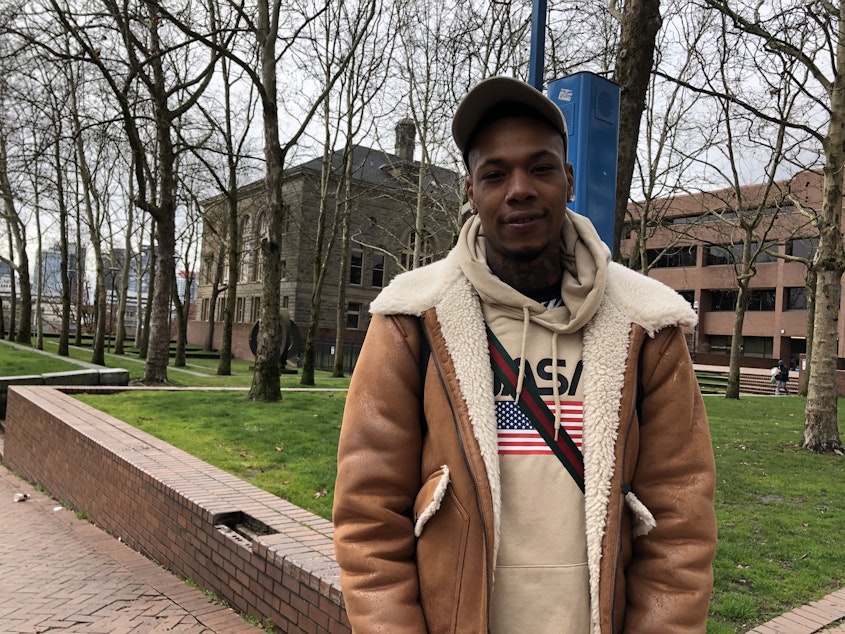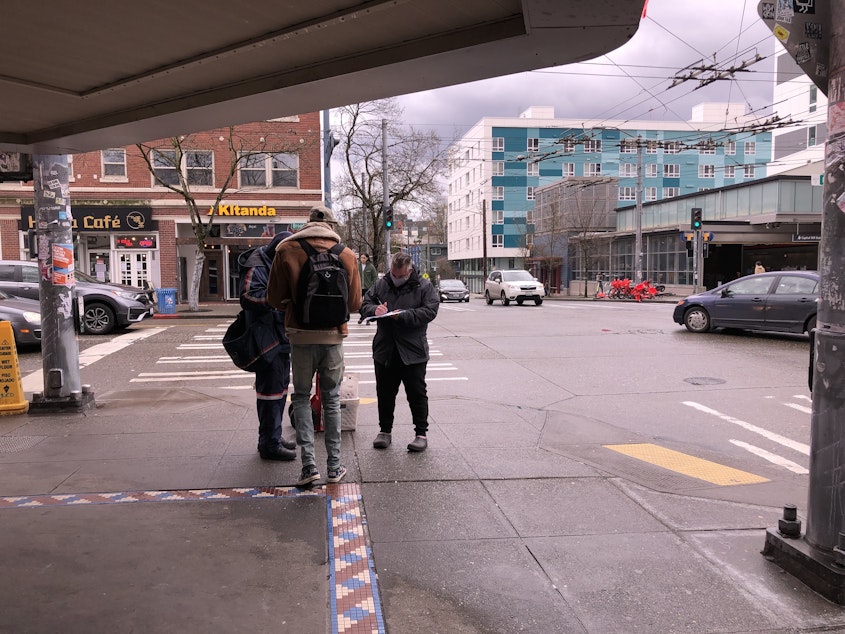Lost your democracy vouchers, Seattle? Campaigns will help you out

If you live in Seattle, you might have received an envelope full of Democracy Vouchers in the mail in recent weeks. Some call them "Monopoly money." But those slips of paper translate into real cash for local political campaigns.
And this is the first year that candidates in the mayor’s race are competing for them as well.
The vouchers are four blue, oversized checks for $25 each. You can sign them over to individual candidates for Seattle mayor, city council, and city attorney anytime through this November, and they get reimbursed by the city.
They’re why campaign worker Jakari Brown is trying to make eye contact with pedestrians on Capitol Hill. He’s collecting vouchers for architect and mayoral candidate Andrew Grant Houston.
“I say, ‘you maybe got two seconds for a signature to help the homeless?'" Brown said. "This is the free democracy voucher program where everybody in the city gets $100 to donate to a campaign.”
Brown tells people that Houston’s proposal to build more tiny houses will make a difference for people who are homeless. People don’t have to have their vouchers with them to donate – Brown supplies replacement vouchers that take the place of the ones they already received.
Election officials are also considering whether to allow campaigns to submit replacement vouchers electronically this year since face-to-face campaigning is more difficult during the pandemic.
Sponsored
Brown has been homeless himself. He got involved in campaign work through the group Community Passageways, which supports at-risk youth. Seattle political consultant Riall Johnson became his mentor.
Since then, Brown said he’s had the opportunity to meet Jay Inslee and Barack Obama, he helped organize a youth-led forum for political candidates, and he discovered he had a talent for bringing in thousands of dollars’ worth of vouchers each week.
The only problem is once he’s helped a candidate raise the maximum allowed ($400,000 in the mayoral primary, for example), Brown is out of a job.
“In all honesty I’m trying to find my place,” he said. “I just know I can raise a whole lot of money for a campaign. I’m trying to figure out how to put that in a job description,” he said laughing.

Sponsored
Riall Johnson and his firm Prism Washington hired Brown to work on this latest campaign. Johnson said his focus is on running campaigns for progressive candidates, especially people of color, around the region. And Seattle’s voucher program allows them to seek support from younger voters and others who wouldn’t normally have funds to donate.
“Allowing more people with lesser income getting engaged with politics is a good thing,” Johnson said, “So yes, it’s transforming the game.”
Johnson said the vouchers give candidates a path without the backing of traditional funders like the Seattle Metropolitan Chamber of Commerce or labor unions.
“I’ve never had a Chamber backed candidate, and hopefully never will,” Johnson said. “This breaks the mold in that you can have a half a million dollar budget without labor or chamber endorsements.”
But progressive candidates aren’t the only ones using the vouchers. In the 2019 general election, all but one of the candidates collected them. Incumbent City Councilmember Kshama Sawant said the fundraising limits required for voucher recipients would make her less competitive.
Sponsored
Wayne Barnett is the director of the Seattle Ethics and Elections Commission. He said political donors used to be a small, elite group, and vouchers have broadened that participation.
“We’ve got more people making contributions and we’ve really muted the voice of big money in Seattle,” he said, because while Amazon and the Seattle Chamber spent a record $1.8 million on City Council races in 2019, most of the candidates they backed weren’t successful.
Critics of democracy vouchers mainly object to its funding source: $3 million per year in property taxes. Seattle property owner Mark Elster brought a legal challenge saying the vouchers violate his First Amendment rights.
“I’m being compelled to fund the political speech of other parties that I likely or could disagree with,” he said.
Elster lost his case. The Washington Supreme Court ruled that the program is “viewpoint neutral” and available to all candidates. Elster said Seattle politics are so left-leaning, he doesn’t know if he’ll find a candidate he wants to support with his vouchers this year.
Sponsored
“I can hope,” he said.
A recent analysis by Georgetown University found that between 2017 and 2019, while participation in the voucher program “increased across demographic groups, the largest gains were concentrated among white, higher-income and older residents, as well as those who vote regularly in elections.” The researchers encouraged the SEEC to continue outreach efforts to historically underrepresented groups. Only seven percent of those eligible to donate vouchers did so in 2019.
Seattle residents can send their vouchers to any campaigns they choose, in the primary or the general election. In the mayor’s race so far, Colleen Echohawk, the executive director of the Chief Seattle Club, and City Councilmember Lorena González have qualified for the vouchers, along with Andrew Grant Houston.
Houston said the democracy vouchers are making his campaign possible, “especially as a small business owner who is struggling through the pandemic.” He is also working as interim policy manager for Seattle City Councilmember Teresa Mosqueda.




